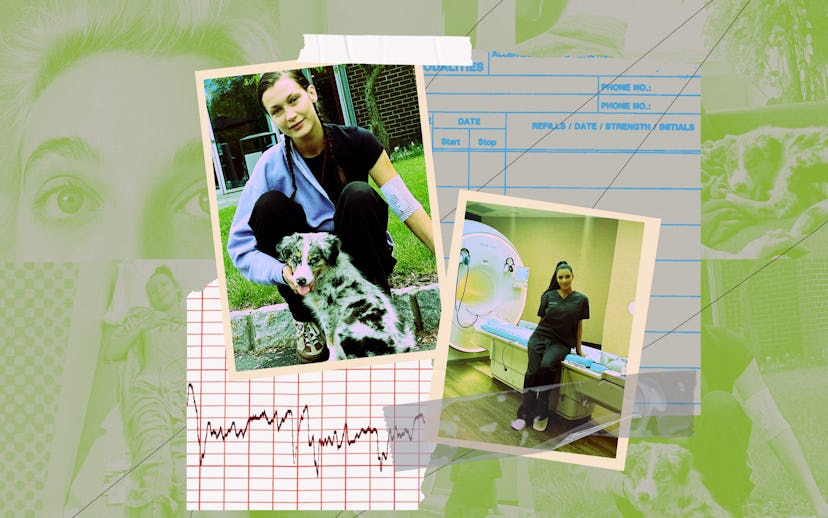
Beauty
Full Body Scans, Health “Journeys” And The Psychology Of The Medical Photo Dump
With celebs all over social media posting private medical information and promoting the Prenuvo Scan, it begs the question—when did the doctor’s office become a hub for content creation?
Over the past few years, “casual” Instagram has overtaken the overly aesthetic and highly curated posts that previously dominated the platform. Instead of fit pics of influencers in designer clothing or celebrities in their mansions, we’re increasingly getting blurry (and silly) snaps from Dua Lipa or low-res diner photos from Iris Law. Whether it’s photos of fries, a messy room, running everyday errands, or fun photos out with friends, the casual celebrity “photo dump” has become a way for stars to show they’re just like us (only in more expensive outfits). And the latest iteration of this “relatable” curated mess is documenting a trip to the doctor’s office.
Last month, Bella Hadid posted a series of IV-filled photo dumps (where she initially posted photos of her medical records and later deleted them) documenting her health journey after a hiatus. Last year, Emma Chamberlain documented her eye infection via an Instagram slideshow. Even Tom Holland has posted the immediate aftermath of his wisdom teeth removal. The rise of candid medical posting of all kinds, says Melissa Doft, double board-certified plastic surgeon, has been propelled by the increase in plastic surgery recovery videos on social media. Even Marc Jacobs posted about recovering from a facelift on Instagram back in 2021, after all. “It’s becoming less and less taboo to post about, particularly for teenagers,” she says.
While posting plastic surgery content on social media may help reduce shame around the procedures and give more of a realistic idea of what recovery can look like, Doft says that giving medical advice to others online without a license can be dangerous. The same medical advice does not hold true for every person, so it’s not something to give—or take—indirect recommendations about. The line between destigmatization and advice can get confusing, especially when it is the most influential people online who are posting.
Just this year we’ve witnessed the rise in bizarre celebrity-endorsed Prenuvo posts, with the likes of Kim Kardashian and Paris Hilton recommending the Prenuvo full-body MRI scan. Aside from the scan ringing in at the inaccessible cost of $2,499, experts say “there’s just no evidence to support” healthy people undergoing full-body M.R.I. screenings. Celebrity recommendations, by all means, are not new, but previously hovered more over the unregulated and nebulous “wellness” space. But now, with the idea of wellness has become increasingly “medicalized” online, recommendations are presented as more scientific than they actually may be. It’s not all about flat tummy teas or hair gummies, anymore—it’s getting a blood cell analysis for “imbalances”.
Sarah Unger, president and founder of the cultural insights and strategy advisory company Cultique, says there’s currently a “super-charged” focus on health in the growing wellness industry, especially when it comes to “clean” beauty and supplements. This has gone hand-in-hand with the pandemic bringing out the “hypochondriac in all of us”, she explains. She also notes that doctors became trending public figures on TikTok during this time. “We have a crisis in our healthcare system in the US and the wellness-industrial complex is stepping in to fill in the gaps,” Unger says. “People are seeking solutions outside the system.” This, unfortunately, comes at the risk of encountering misinformation while scrolling.
Unger says that it's no surprise that we’re seeing Gen Z being more candid with medical information online overall, considering their willingness to discuss mental health openly. “In a chaotic world, where very little feels within our control at times, publicly sharing medical content may help people feel in control of their health story,” she says. Once this raw content becomes a tool for virality, however, it becomes at least partially performative—as is the case with all social content. “The human body provides no shortage of gross-out visual flexes, just look at the questionable ‘hot girls have IBS’ TikTok trend,” she says. “Medical stuff can be cringe, vulnerable, and even subversive: all foundational to extremely online culture.”
Sophia Yen, board-certified pediatrician the co-founder and chief medical officer of Pandia Health, believes it’s a good thing that the youth aren’t “as embarrassed as other generations” when it comes to talking about their medical history. Some posts can even serve as helpful reminders for others about following CDC recommended guidelines for health check-ins. Doft cites posting about your pap smear (something she does) as an example of a helpful medical post. However, Yen still cautions people about sharing the documents themselves. “Assume that any medical information you post online is public because ‘online’ means ‘public’ and that might affect your insurance costs in the future,” she says.
It’s clear that the internet is currently obsessed with consuming and sharing TMI when it comes to the world of plastic surgery, which is trickling down to the realm of general doctor’s visits. But just because your favorite celebrity has posted a medical photo dump doesn’t mean you should follow their medical advice. While speaking candidly about previously taboo procedures can help destigmatize certain medical issues and conditions, that doesn’t make everyone who’s posting about medicine online an expert. As Doft puts it: “It’s about the tone. Ask yourself if it is a recommendation or a testimony,” she says. “I think when it comes to recommendations, it should be done by physicians.”
This article was originally published on